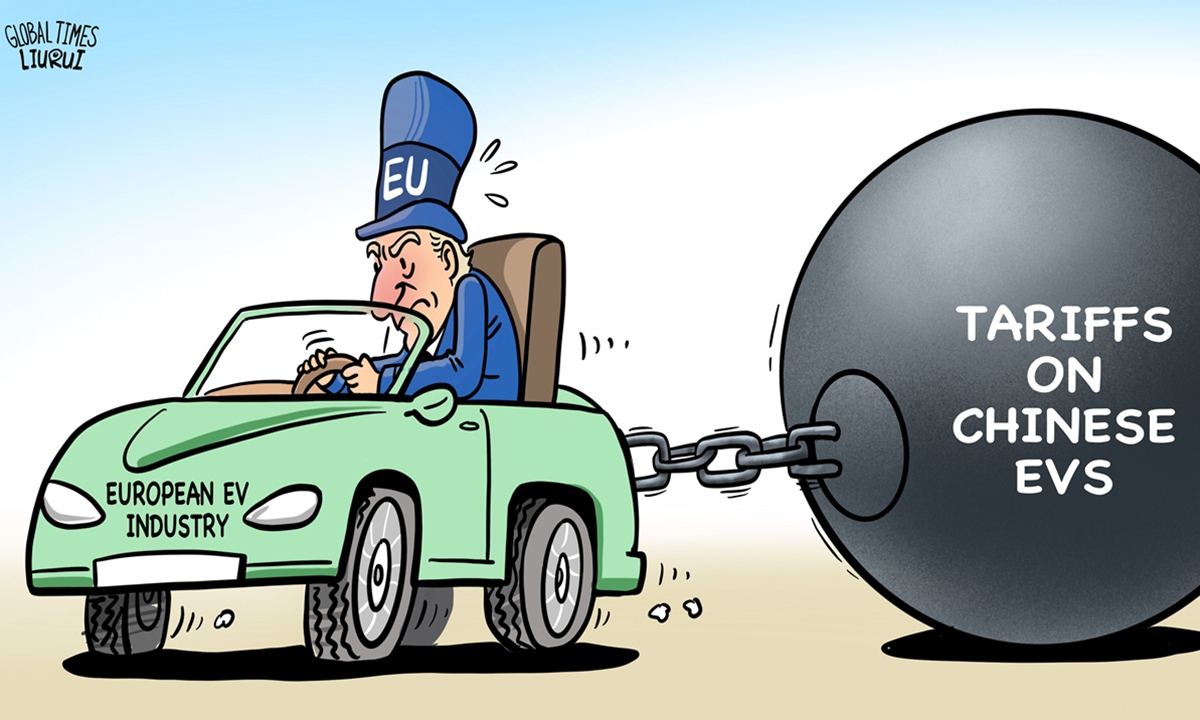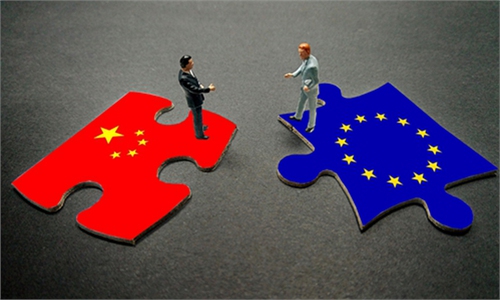
Illustration: Liu Rui/GT
If the EU really wants to protect its domestic industries and save the jobs of its citizens, it should reconsider its approach to establishing trade tariffs on China. Countervailing duties can lead to falling profits, job losses and company closures in the very sectors that these punitive measures are intended to shield, and in the very countries that will impose them. Inevitably, ordinary consumers of the goods will quite literally pay the price in higher costs in any trade war. What exacerbates the latest EU decision is a sense of irrationality and hypocrisy on the part of Brussels.
In the booming electric vehicle area, Europe accuses China of providing unfair subsidiary to its EV producers, enabling them to undercut competition from the bloc's domestic manufacturers. Despite conducting an investigation into the issue, the EU has no definitive evidence. As a matter of fact, China's impressive economies of scale, low production costs and advanced technological expertise play greater roles than any subsidies.
Not only do the tariffs imposed on Chinese products - up to 35.3 percent on Chinese-built electric vehicles on top of an existing 10 percent - make poor economic sense, but they also make little political sense.
These tariffs are economically unwise. Industry analysts predict that European EV manufacturers will remain dependent on Chinese and other Far Eastern-made batteries until at least 2030, regardless of anything they may do in the immediate and short term to offset the negative backlash of the tariffs.
Politically, the duties, set to come into force on October 31, have been pushed through by a quite narrow margin. There is no groundswell of support or international consensus that this approach will safeguard the electric vehicle dealers within the borders of its 27 members. Most countries did not vote for it.
Although it was a closed session, media reports suggest that at the bloc's meeting which approved the measures this month, only 10 nations voted in favor of the proposal, five voted against it and the remaining 12 countries abstained. Even considering the EU's complicated qualified majority voting system, this represents a clear split within Europe and hardly constitutes a ringing endorsement of a policy that could have far-reaching consequences. The majority of countries do not support it.
In Europe, Chinese EVs account for 11 percent of the market. One of the five opposing states, Germany, lobbied hard against the plan ahead of the vote. Three of the biggest German car manufacturers have also fought against the tariffs. Earlier this year in Sweden, the CFO of Swedish EV maker Polestar, Per Ansgar, predicted that import tariffs will harm companies based in Europe and that some manufacturers are accelerating plans to move parts of their production process outside the EU in direct response to the tariffs already imposed on China by the US, Canada and Europe.
Dara Khosrowshahi, the CEO of ride-hailing company Uber, told the BBC in a television interview that Chinese-made EVs are cheap, high-quality products that are good for the environment and part of the solution to the climate crisis. It makes no sense to make them more expensive by slapping import duties on them.
But it is not only in the automobile category that the EU's use of tariffs is spreading discontent. Paint manufacturers from the EU are warning that the ultimate effect of tariffs on titanium dioxide from China will bankrupt smaller producers and force larger manufacturers to move production outside the bloc. The chemical is a crucial ingredient in paint. A shortage of affordable raw materials caused by tariffs of 39.7 percent will create costs that will have to be passed on to customers.
There could be knock-on effects in other areas that utilize titanium dioxide, including pharmaceuticals and cosmetics. It is also a component in the production of aerospace-quality titanium metal. In almost every sector of every industry affected by the EU tariffs, it is ultimately the domestic consumer who picks up the tab. Europe's unwise gesture is actually signaling higher prices, lower profits and fewer jobs.
A study found that the US-initiated trade war with China in 2017-2019 resulted in the loss of 245,000 jobs and a reduction of $121 billion from its GDP. It is hoped that the EU can see far enough into the future to realize that these kinds of actions have a cost and that tariffs will do more harm than good.
The author is a journalist and lecturer in Britain. opinion@globaltimes.com.cn

